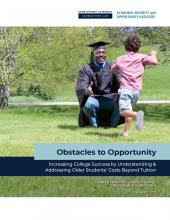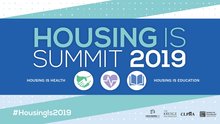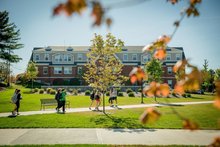Found 65 resources.
0
0
0
Every child in an early childhood setting should have a teacher with specialized education to promote that child’s cognitive, social, emotional, and physical development and who prepares them for success in school and in life. The National Research Council’s report from a panel of experts, Transforming the Workforce for Children Birth Through Age 8: A Unifying Foundation, lays out several recommendations for programs serving children from birth through age 8, notably that teachers "should have at a minimum a bachelor’s degree and specialization in the knowledge and competencies needed to...
Topics: Early childhood, Education, Post-secondary
 Shared by Kirsten Greenwell
on Jun 30, 2021
Shared by Kirsten Greenwell
on Jun 30, 2021 0
0
0

Higher education offers millions of people the opportunity to improve their financial well-being. However, higher education is prohibitively expensive and can saddle people with insurmountable debt. Costs beyond tuition—such as housing, food, child care, and transportation—are large, essential components of the cost of attending college for students. In order to better understand how these living costs add up and vary, this report offers estimates of costs beyond tuition for older students between the ages of 25 – 45, who make up roughly one-third of college students and face unique barriers...
Topics: Attendance, Community development, Education, Housing, Post-secondary, Stability, Workforce development
 Shared by Housing Is
on May 20, 2021
Shared by Housing Is
on May 20, 2021 0
0
0
Meet with members of CLPHA’s Postsecondary Leadership Institute to learn about how PHAs and postsecondary partners are working with students. Attendees will have a chance to hear short presentations about innovative approaches for improving postsecondary success and then ask questions in small groups.
Topics: CLPHA, Community development, Data sharing, Partnerships, Post-secondary
 Shared by Housing Is
on May 18, 2021
Shared by Housing Is
on May 18, 2021 0
0
0
Colleges support students with advising, counseling, or coaching in academics and other skills they need to succeed in school. Some colleges enhance those services through reduced adviser caseloads and more comprehensive, frequent guidance, which can improve students’ semester-to-semester retention and average credits earned. This overview describes important lessons on designing and implementing those services. College leaders and administrators committed to designing, building, managing, and continually supporting enhanced advising services can consult this checklist of recommendations as...
Topics: Attendance, Child welfare, Community development, Education, Grade-level proficiency, Post-secondary, Workforce development
 Shared by Housing Is
on Mar 4, 2021
Shared by Housing Is
on Mar 4, 2021 0
0
0
The ninth in a series of Research-to-Impact briefs by Chapin Hall at the University of Chicago on understanding and addressing youth homelessness.
For the 4.2 million adolescents and young adults who experience some form of homelessness, opportunities to develop and realize their educational aspirations are often disrupted. Missed Opportunities: Education Among Youth and Young Adults Experiencing Homelessness in America highlights research on the intersection between youth homelessness and educational disruption. We learned that young people experiencing family instability and trauma are at...
Topics: Attendance, Education, Homelessness, Post-secondary, Youth
 Shared by Housing Is
on Oct 15, 2020
Shared by Housing Is
on Oct 15, 2020 0
0
0
The nation’s community colleges play a central role in producing a more educated workforce and promoting social mobility. They serve about 40 percent of all college students and, not surprisingly, they serve a disproportionate number of low-income and underrepresented students. But most students who enter these colleges do not graduate — only about a third of entering students earn a degree or certificate within six years.
Among the many programs that have attempted to increase graduation rates, one program stands out. Developed by the City University of New York (CUNY), the Accelerated...
Topics: Attendance, Education, Post-secondary, School-readiness, Workforce development
 Shared by Housing Is
on Oct 6, 2020
Shared by Housing Is
on Oct 6, 2020 0
0
0

Community colleges graduation rates remain low. Some studies have shown that students who enroll in summer courses are more likely to stay on track and graduate, yet despite these benefits most college students do not attend during the summer.
So why don’t students attend, and how can colleges encourage more of them to enroll in the summer? To answer these questions MDRC launched the Encouraging Additional Summer Enrollment — or EASE — project in partnership with the Ohio Association of Community Colleges and 10 community colleges in Ohio. MDRC designed, implemented, and tested two...
Topics: Attendance, Education, Post-secondary, School-readiness, Workforce development
 Shared by Housing Is
on Oct 6, 2020
Shared by Housing Is
on Oct 6, 2020 0
0
0
Bridge-to-college programs aim to help people complete high school and enroll in postsecondary education. This evaluation of one such program at Northeast Wisconsin Technical College in Green Bay finds that it helped more students earn their GEDs and enroll in college courses.
Topics: Education, Post-secondary, Workforce development
 Shared by Housing Is
on Oct 6, 2020
Shared by Housing Is
on Oct 6, 2020 0
0
0
Innovative public housing authorities (PHAs) are collaborating with college access partners and community colleges to increase postsecondary educational achievement for low-income residents and college students experiencing homelessness. This report elevates 11 shared learnings from a recent convening of these five pioneering PHAs and their postsecondary collaborators, and offers a series of recommendations to policy makers, PHAs, and philanthropic organizations seeking to develop emerging cross-sector collaborations between housing and education organizations. The report also includes an...
Topics: CLPHA, Education, Housing, Legislation & Policy, Low-income, Partnerships, Post-secondary, Stability
 Shared by Abra Lyons-Warren
on Oct 6, 2020
Shared by Abra Lyons-Warren
on Oct 6, 2020 0
0
0
A discussion with attorney Alex Elson from the National Student Legal Defense Network and director of FAIL STATE, Alex Shebanow, to talk about predatory for-profit institutions and how that affects low income residents.
About the film:
Over five years in the making, FAIL STATE investigates the for-profit college industry and the decades-long reports of student loan abuse within the sector. The film’s central thesis: aided by a cabal of politicians, nationwide disinvestment in public colleges and universities, and an unscrupulous desire to maximize profits at all costs, for-profit colleges...
Topics: Advocacy, CLPHA, Education, Housing Is Working Group, Legislation & Policy, Low-income, Post-secondary
 Shared by Abra Lyons-Warren
on Feb 12, 2020
Shared by Abra Lyons-Warren
on Feb 12, 2020 0
0
0
Access to affordable child care can be a major barrier for low-income parents who want to participate in education and training activities to gain skills or obtain employment. Child care assistance from the Child Care and Development Fund (CCDF), the federal block grant that funds states to provide child care assistance to low-income families, can help alleviate this barrier and make it easier for low-income parents to participate in activities that improve their skills and lead to stable employment with adequate pay. However, the CCDF eligibility requirements and priorities for service are...
Topics: Child welfare, Early childhood, Education, Legislation & Policy, Post-secondary, Research, Workforce development
 Shared by Housing Is
on May 30, 2019
Shared by Housing Is
on May 30, 2019 0
0
0

Navigating college as a first-generation college student can feel like making your way through a maze with no map, filled with “learn as you go” lessons, and “wow, I wish I knew this then.” When you combine it with being low-income, homeless, and/or food insecure, it can feel like you’re navigating the same maze blindfolded, on a tightrope, balancing multiple responsibilities. It should not be like this.
Topics: Low-income, Post-secondary, Stability, Youth
 Shared by Housing Is
on May 29, 2019
Shared by Housing Is
on May 29, 2019 0
0
0

Join CLPHA and the Kresge Foundation as we announce the release of our new report, Eliminating Barriers to Postsecondary Success: Cross-Sector Collaborations to Improve Postsecondary Achievement for Students Served by Public Housing Authorities. The report provides an overview of promising practices at the intersection of public housing providers and higher education shared during a convening of five pioneering PHAs and their postsecondary partners. This press event is open to all attendees and will be immediately followed by a panel discussion, which will spotlight the innovative housing and...
Topics: CLPHA, Communications, Education, Homelessness, Housing, Partnerships, Post-secondary
 Shared by Housing Is
on May 24, 2019
Shared by Housing Is
on May 24, 2019 0
0
0
This webinar explored strategies for leveraging data to support college and career readiness and success (CCRS) goals for all students, with special emphasis on students in foster care. With access to quality data, education and child welfare agencies can work together to improve educational outcomes and promote CCRS for students in foster care. Presenters discussed a set of emerging practices that serve as examples of how states can use and link data to support CCRS. As states work to fulfill the requirements of the Every Student Succeeds Act (ESSA), this webinar also aims to provide...
Topics: Asset building, Foster care, Post-secondary, Workforce development, Youth
 Shared by Housing Is
on May 21, 2019
Shared by Housing Is
on May 21, 2019 0
0
0

That’s according to the fourth and largest survey of college students’ ability to afford food and housing
Topics: Food insecurity, Low-income, Nutrition, Post-secondary, Research, Youth
 Shared by Housing Is
on May 6, 2019
Shared by Housing Is
on May 6, 2019 0
0
0
College Promise programs aim to make students believe they can afford college, and to give them the opportunity to go to college and earn degrees without taking on significant debt. At the core of all College Promise programs is a scholarship: All eligible College Promise students receive scholarships that may cover up to 100 percent of tuition and fees at postsecondary institutions. Additionally, many Promise programs are designing, implementing, and refining additions to their models by providing students with support services once they enroll in college. MDRC’s College Promise Success...
Topics: Education, Low-income, Post-secondary, Research, Youth
 Shared by Housing Is
on Apr 24, 2019
Shared by Housing Is
on Apr 24, 2019 0
0
0
Detroit’s Promise program was designed to encourage college attendance among some of the nation’s most underserved students, those in Detroit, Michigan. The next step was to help students succeed once they enrolled in college. To do so, MDRC and the Detroit Promise partnered to create the Detroit Promise Path, an evidence-based student services program. Detroit Promise Path students begin meeting with college coaches in the late summer before their first semester of college. They are given an incentive to attend coaching meetings in the form of a monthly gift card refilled with $50 each month...
Topics: Education, Low-income, Midwest, Post-secondary, Research
 Shared by Housing Is
on Apr 24, 2019
Shared by Housing Is
on Apr 24, 2019 0
0
0
In the United States, nearly 13 percent of people are food insecure, living without reliable access to basic nutrition. But the problem is even more dramatic on college campuses, where a recent study found that 48% of students report food insecurity and live without regular access to food.
Topics: Food insecurity, Nutrition, Post-secondary, Youth
 Shared by Housing Is
on Apr 22, 2019
Shared by Housing Is
on Apr 22, 2019 0
0
0

A New Hampshire-based college with a large online enrollment plans to open a new operations center in downtown Tucson in early 2020 that will eventually employ up to 350 people.
Topics: Asset building, Post-secondary, Workforce development
0
0
0
Education Design Lab taps four large community colleges in an ambitious effort to raise single-mother completion rate 30 percent at each institution by 2024.
Topics: Dual-generation, Early childhood, Family engagement, Low-income, Metrics, Post-secondary
0
0
0

Founded in 1995 as Project Women, Family Scholar House (FSH) provides comprehensive, holistic services for disadvantaged single parents, their children, and foster alumni. The nonprofit seeks to end the cycle of poverty and transform communities by empowering families and youth to succeed in education and life-long self-sufficiency. FSH provides supportive housing, educational programming, and participant advocacy to help families gain independence.
Topics: Dual-generation, Early childhood, Education, Homelessness, Housing, Low-income, Partnerships, Place-based, Post-secondary, South, Stability
0
0
0
With 22 percent of the undergraduate student population comprised of parents, policymakers and institutions must explore the unique needs of this population and address the challenges that may prevent parents from attaining their degree. This includes determining what systems, services, and approaches best support their mental health needs. This brief examines opportunities for policymakers and academic institutions to adapt existing mental health services in order to meet the unique needs of students who are parents and help them complete their degree.
Topics: Dual-generation, Early childhood, Mental health, Post-secondary
0
0
0
Investments in the postsecondary success of parents with young children can increase attainment of credentials leading to good jobs, bring children the benefits of high-quality learning environments, promote later college-going among children, and improve family economic security across generations. This factsheet provides figures on the student parent population based on the latest National Postsecondary Student Aid Study data.
Topics: Dual-generation, Early childhood, Post-secondary, Research, Youth
0
0
0
A brief to help state and local agencies identify opportunities to align and leverage policies, programs, and funding across the three laws to support the education-to-workforce pipeline; a workbook to facilitate cross-agency conversations to identify and plan for alignment opportunities across ESSA, Perkins V, IDEA and WIOA; and an interactive tool that identifies specific language in the laws that address college and readiness topics and help state education agencies and local education agencies find new or greater alignment opportunities in their plans.
Topics: Asset building, Education, Legislation & Policy, Post-secondary, Workforce development, Youth
0
0
0
Now colleges and universities themselves are pulling together more permanent solutions, often in collaboration with local housing authorities and non-profit partners. In some cases, colleges and universities are trying to avoid losing enrollment; not surprisingly, students in unstable living environments or who can't afford food have poorer physical health, symptoms of depression and psychological stress, and are more likely to drop out, research shows.
Topics: CLPHA, Homelessness, Housing, Low-income, Partnerships, Post-secondary, West Coast
